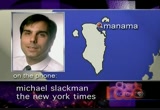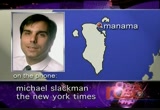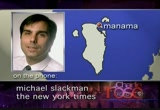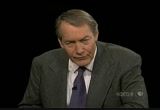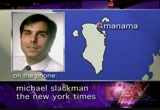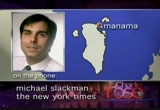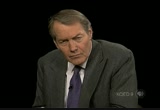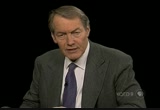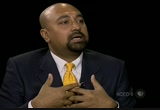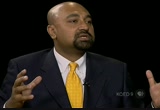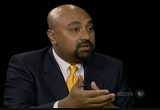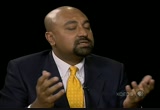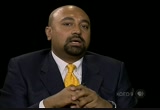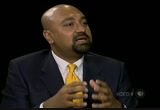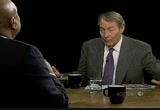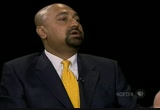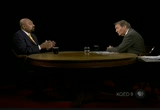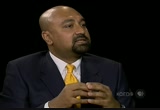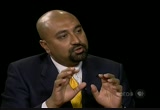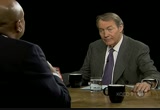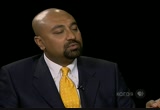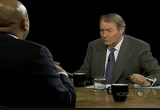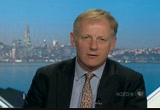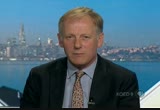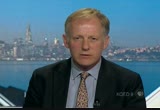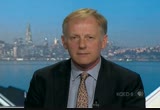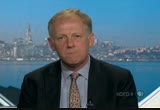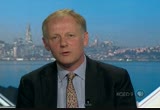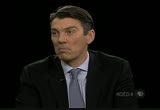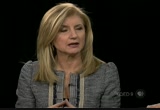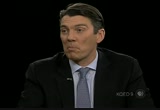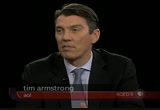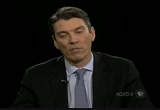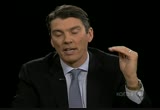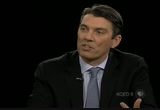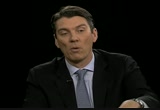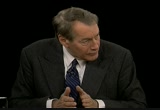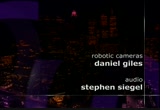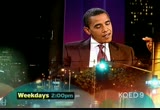tv Charlie Rose PBS February 18, 2011 12:00am-1:00am PST
12:00 am
more in the women's space and a lot more around causes and cause marketing. so that is really an incredible opportunity to do it together and bring that shared vision to life. >> the premise for us on the investment with hufg on the post is really about the belief that brands are how people cure rate their lives, that the internet is only going to be growing and become a bigger place that needs more brands and needs more transparency and needs more ability to navigate. >> rose: the middle east, artificial intelligence, and online news when we continue. maybe you want school kids to have more exposure to the arts. maybe you want to provide meals for the needy. or maybe you want to help when the unexpected happens. whatever you want to do, members project from american express can help you take the first step. vote, volunteer, or donate for the causes you believe in
12:01 am
at membersproject.com. take charge of making a difference. >> captioning sponsored by rose communications from our studios in new york city, this is charlie rose. >> rose: after three days of protests in bahrain, the military took control today over most of manama, the capital. a ban on demonstrations was also put in place. the measures came after riot police fired shotgun pellets, tear gas and concussion grenades at the demonstrators. u.s. secretary of state hillary clinton urged restraint in a call to the country's foreign
12:02 am
minister. joining me now on the telephone from manama is michael slackman of the "new york times." for five years he covered the middle east for the paper and is now berlin bureau chief. michael, thank you for joining us. tell us what happened last night and what's happening today. >> it's nice to be here charlie. last night at about midnight, the square was a festive center of empowerment for a community that has long felt disenfranchised, marginalized in the political arena here. there were families, men, women children who set up camps in the symbolic center of the capital city of manna. the day would alternate feeling as though you were sitting in the living room or the block party of a huge community and a political rally. as the day's events ended, as people went home, there was a small group-- not a small group,
12:03 am
there were hundreds, thousands who spent the night, as i said, camped out on blankets, including women and children. i'm in a building one block away on the eighth floor and i'm able to see right in the square and at 3:00 in the morning we saw an army of police cars, armored vehicles pour into the square, blue lights flashing. and within an instant we heard an incredible amount of weapon fire. and you could see as far as away as we were the tear gas literally beginning to rise off the square. we ran down, jumped in a truck and made our way there within minutes and the tear gas was simply overpowering. it was impossible to really deal with the burning sensation. people around were throwing up. we managed to come around back and get into a gas station where people had escaped to and witness after witness said the same thing, that they were sleeping, the police came in and without warning simply opened fire. last night most of the people talked about the tear gas
12:04 am
because that was the thing that affected them the most. but today at the hospital they showed us, talked to us about how the police opened fire with shotguns and at least two men that were dead, i saw the bodies from the morgue had been sprayed with bird shot. >> rose: so what is the government saying about what it intends to do? >> the government hasn't said what it intends to do at this point. the government is simply saying they have the right obligation and will to preserve order on the street. the government is saying that these protestors resisted and that's why the police resorted to lethal force. but that's not what i saw happening. they went to lethal force almost instantly which is the same thing that happened on the first day of these protests, on the 14th. they simply opened fire at anybody who dared to march on the street or show dissent. at this point, we're kind of in the... the nation is griped in a bit of anxiety because the
12:05 am
government is saying we will use very strict and harsh measures to prevent anybody from going out on the street and the opposition is saying they're going go out on the street. so the question is will either side blink or will somebody find a way to... out of this through compromise and dissdmugs >> you were a long time in cairo and then you were there at the beginning of the january 25 revolution. how is it similar and how is it different? >> well, it's similar in the sense that in both countries the underlying grievances were long standing. there was a long standing feeling in both places of being marginalized and disenfranchised of an autocratic leadership in egypt, in this case a monarchy here. they're different in part because in egypt you have a relatively homogenous society. everybody is of the same primarily sunni muslim.
12:06 am
off small christian community. and the community united behind not ooid logical but very concrete demands in their call for democracy, rule of law and equal opportunity, improved education. things like that, a new constitution. end of correction. issues that people were all across egyptian society were able to unite behind. the only people who would poe potentially lose out were regime insiders who would benefit from the privileged status. behind it's quite different because you have a divided society. you have a very small population 700% of the population is shiites and the remaining portion of the population including the king are sunnis and there's a feeling if one gets the other doesn't. so while the protestors here
12:07 am
were calling for constitutional monarchy and an elected government rather than one appointed by the king and for equal rights under the law it didn't have the same universal ring because the sunnis and people in camp with the king see empowerments of the shiites by necessity taking power and privileges away from them. >> rose: how do you think this will play itself out? >> well, charlie, i would say that anybody who's been watching events in the middle east over the last six months would be crazy to guess. at the moment both sides are dug in, both sides angry, both sides frightened. it seems to me that the way in which the government responded last night, sending in an army of police to attack in the middle of the night people that were sleeping indicates that was degree of panic of a potential
12:08 am
uprising here in bahrain. so i think right now everybody's frightened and angry and i suppose the challenge is is there any way to overcome this sense of sectarian identity and for the community to unite around the sense of identityty. i asked people that and the people protesting said that's exactly what they were trying to do. they were hoping that one of the similarities, charlie, between bahrain and egypt was this was initially driven by young people and they were hoping that the young people could serve as a unifiers with the rest of the community but right now it doesn't theme's the case and they're seeing themselves not as bahrainnys but as sunnis and shi'as. >> rose: the united states has a strategic interest in bahrain. it has a naval base there. do you hear much about what the united states might be doing behind the scenes or whether the united states is expressing its
12:09 am
aspirations? >> my impression from the... speaking specifically about bahrain, i think the united states was alarmed when these protests first started and the government decision was need use lethal force. very harsh force. i understand that at very high levels. the state department contacted officials here in bahrain and requested or suggested that they chill out, back off, and allow for the peaceful expression of political ideas on the street. and i suspect, i believe, that that's one of the reasons that there was some room for the opposition to get into pearl square in the first place and create this unprecedented environment here in bahrain. so i think that the united states initially had some
12:10 am
influence in opening up of free speech here. within the royal family there were differing views on how to deal with this but hard liners in the system became alarmed at the huge crowds, tens of thousands of strong that poured into the square and decided to take a hard line approach. >> rose: there are divisions within the royal family? where is the crown prince who is with the one-time minister of defense? >> i wouldn't say divisions but i would say certainly at the outset there were differences of opinion. and i don't have evidence of this. they're not talking today. i've requested interviews repeatedly with the government spokespeople and i've had no reply. but just judging from the way in which, first, they had... the approach they took was extremely hard lined then the king went on television and expressed his regrets for the deaths and violence. the interior minister went on and expressed his regret. the police were completely withdrawn from the street. a huge protest started and then
12:11 am
there was no reescalation, they just went from zero to 60 in an instant and as i said, tent? an army to attack sleeping men, women, and children and opened fire on them. >> rose: michael, thank you, i know it's very late there. i thank you for waiting for us and it's, again, a pleasure to have you on the broadcast. >> thank you, charlie. >> rose: unrest in the middle east continued today with six countries seeing protest and violence. from north africa to the gulf entrenched governments are struggling to deal with the largely peaceful wave of dissent. in this week's "time" magazine, bobby ghosh looks at the generation of arab youth leading the protest. in less than two months, he writes, these young people have brought about change "on a scale not seen since the end of the cold war." i'm very pleased to have bobby ghosh back at this table. welcome. >> thanks, charlie. >> rose: how you? >> very good, thanks. >> rose: tell me about... you start this by saying the
12:12 am
following "a generation once dismissed as politically supine has toppled two dictators and shaken up regimes across the middle east. who are they and what to do they want?" >> well, these the kids that for years we had commentators not just in the west but in the middle east saying "this generation is lost, they're angry, frustrated but they're also cowed at the dictatorship's successfully suppressing them. they're feckless, they don't actually have any sort of political activity in that community, that age group, it's inert, they're never going to rise up against the rulers. well, that analysis clearly was wrong. they were there, that this anger and deep unhappiness about their circumstances had been growing and what we now learned was they were talking to each other not only within these countries but across borders using the modern tools of facebook and the
12:13 am
internet and they were able to communicate with each other and discover that their own sense of unhappyness was not unique and this was being felt across the region. and in every one of these countries there was an incident that a final straw that broke the camel's back whether it was the young man setting himself on fire in tunisia or a young man being beaten to death by police in egypt. in yemen it was a... the story of 30 families from a remote tribal areas whose land was taken away from them and given to somebody who was close to president saleh. there were these individual instance which is by themselves were not uncommon in those countries but they arrived at a moment when people had had enough. these young people decided this is this has gone far enough, we're going to do something about this. and then they were able to feed off each other because once it happened in tunisia... in tunisia the egyptians said well if they can do it; we can do it. now the egyptian example has been picked up by the bahrainis,
12:14 am
the yemenis and so there is an expression that went out of fashion after the cold war, dominos. >> rose: and they found out they were better organized and more strategic than the people who might try to oppress them? >> yes, their use of technology because they were a much judger younger generation of officials than the government monitoring their behavior, they were able to operate under the government's radar by using the internet as their tool. there's also the role, let's not forget. of satellite t.v. specifically of al jazeera, that was able to take these sort of different disturbances that were taking place around the region and put them together and present a picture of an entire society. >> rose: suggesting you're part of something larger than just is happening in your immediate face
12:15 am
>> yeah. >> rose: so do they want to rule or simply want to change? >> they want change. keep in mind that most of this generation in many of these countries have only known one ruler. if you're 30 years old and you're in egypt. you've never known another president other than hosni mubarak. >> rose: he was president when you were born:. >> exactly. the same goes for yes, ma'amnys. president saleh has been in power for 3 3-2 years. it's also true in libya where qaddafi has been in charge for 41 years. they want change. we've asked this question across the region, what do you want and they talk in fairly loose terms about democracy. they don't fully understand what it is but the one thing they want most of all is the opportunity to kick the bums out. they want elections that... we have a guy in our story who says "i don't care who takes power, i don't care who the next government in egypt is, as long as four years if now if i don't
12:16 am
like them i can change. that's what they want more than anything. that's the most attractive thing about democracy. accountability. >> rose: and so the ideaed that this contagion is taking place but does it have staying power in terms of the terms of change? >> i think it does. you will see basically two patterns emerge. in countries where the regime have their own private office-- i use the term loosely-- you have an armed foors in the country whose only job is to protect regime, not the nation, not the borders but the regime. those countries, those governments can use that to suppress. we're seeing that in iran, for instance. the president of iran can call upon the revolutionary guards and the be siege whose only role is to protect the regime.
12:17 am
the egyptians were not able to do that because that's not the military's job. the military's job was to protect the countries, not turn against its own people. so in states where you have these private army there is will be... the empire will strike back. you're seeing that in iran, to some degree in bahrain. the bahraini army is predominantly sunni. there are a lot of mercenaries, a lot of former soldiers from saddam hussein's army now working in bahrain. so the king of bahrain is able to call on these people to crack down against his people. >> rose: so what are the expectations for bahrain in your judgment? >> i think the crucial question will be can after these last two days of violence can the young people rally again in numbers that they were able to a couple of days ago and come back. the bahrainny king has played his hand. he brought the army out. he fired upon his sleeping people. it's hard for them to go anyone
12:18 am
else from here. if they can come back to the round about or some other area in tens of thousands-- it's a small society-- if they come out in the tens of thousand it is king can't... i don't think that the king can order massive slaughter. so i suspect if they can rally again then the king will have to make more concessions. >> rose: what's the possibility that somehow this will bring in other forces outside of the place to help the young people. >> well, that's always the fear that many of these regimes have used against them. if you ask the regime in bahrain, the regime's spokesman will say "well, the iranians are helping these people." that's the boogieman that the state has always been able to use. and, in fact, in egypt as we saw, that's... the mubarak regime's first response to these protests was "well, it's the
12:19 am
islamic brotherhood, these are radical dangerous people." well, in this day and age thanks to al jazeera, thanks to facebook, thanks to a global attention that's now being paid to these regions you can't get away with bluffs like that anymore and the obama administration and the governments of europe have already shown that they have now in the past couple of months a better understanding of the social and political dynamics of this region. so for the king to now pretend that foreigners are influencing or are the sort of agents provocateur of this uprising i don't think anybody's going to buy that. >> rose: what do they want from outside forces like the united states? >> not a whole lot. not a whole lot. the other thing that's common with these kids is that throughout their lives they've seen the u.s. as an enabling force. a government that enables their desperation, that enables their despots to rule over them. so they're not terribly fond of
12:20 am
this. on the other hand, they don't have a sort of visceral animosity to americans. the one thing that we have not seen, two months of protests across the arab world, how many american flags were burned? >> rose: none that i saw. >> exactly. how many times was the effigy of an american president hung from a tree? none. so that tells you that there is an opportunity for the u.s. to make connections to this group. they will be suspicious if not hostile. but there's a hump the obama administration has to cross in order to reach out. >> rose: how do you make an argument that we want to be on the right side of history and yet at the same time we're not... as soon as it gets tough for our friends we can change sides. >> rose: the one thing we have to figure out, who are our friends. >> rose: right. >> over and over again while the uprising was taking place in egypt you would hear hear
12:21 am
someone from the administration or someone in general saying well, egypt has been our friend. that's not true. egypt hasn't been our friend. mubarak has been our friend. let's recognize who our friends are really. i think once you do that it opens up that possibility. mubarak's gone. we need new friends. the other thing that many of these young people have been telling us is there's no consistency in the american foreign policy? that region. on the one hand, the president of the united states expresses openly after initial hesitation openly his support for the uprising in iran as he did last year. he came out and supported the green revolution, he spoke very forcefully, very eloquently in the favor of those who wanted to change. on the other hand, he didn't say the same things about arab... young people in the arab world who were asking for the same thing. so people people see that and say well, the united states doesn't really stand for any one thing. the united states is as
12:22 am
duplicitous as our own government. so the now now for the white house is to get over that suspicion. >> rose: and how could they do that? there's a story in the "new york times" that the president has ordered a study. but my sense is that he doesn't need a study, he's pretty clear. >> you know, behind the scenes there have been some efforts since 9/11 under the bush administration and continuing under the obama administration there has been outsbrech the young arab world. there are programs at the state department and other government departments that have been running for several years now. they bring young egyptians, young bahrainis to the u.s. to discuss democracy, to discuss entrepreneurship, to discuss law and legal issues these are very low key programs and for a long time the government didn't want... white house didn't want too much attention paid to them
12:23 am
in the media because you would actually harm those people's interests if you let it be known they were working with the u.s. well hopefully now some of those relationships can come out from the shadows and mature and deepen. but it's going to take some time and now more than ever america's actions-- not just the president's words but the americans' actions in those regions-- are going to be observed very, very carefully. >> rose: what should we be looking for next. >> these young people have brought revolution in egypt and in tunisia, maybe in a couple other places as well. they've made revolution happen, they've toppled the regime, sent their dictators packing. now... those countries are still run by the generation older than them. now it falls to that generation to show that they're capable of changing the way those countries rule.
12:24 am
you asked at the begin dog they want to rule these young people. not yet. but they want to make sure these new rulers-- whoever they are-- are responding to their needs. >> rose: and they want them to be accountable and they want to be able to have some kind of pressure that they have, the possibility of using in egypt, they say, will go back to the square. if the army doesn't deliver as they expect, if the transition to civilian authority does not take place what are you prepared to do and they say we're prepared to go back into tahrir square. >> they've seen it works. they see they now have a weapon and finally after a lifetime of feeling helpless they now have a weapon. if they can get rid of mubarak, they can get rid of anybody. that's what they're thinking now. >> rose: and what came with getting rid of him was the absence of fear. they lost the fear, they overcame the fear. >> yes. >> rose: i talked to someone over there who was an older person who said to me "we were cowards." that's far too judgmental about themselves, perhaps, but they
12:25 am
have courage and they have the absence of fear and that has served them remarkably well. >> yes. they called the regime's bluff. they were able to show and they were able to expose it as a bluff. they were able to show that these dictators for all their bluster were not really... did not really have the tools anymore to suppress. their numbers were too large, their sincerity was deep, their passion was too great. and the... their rulers were not able to turn the guns. >> and they have great pride in themselves and great self-esteem. >> absolutely. this is the generation that can. the generation that has. and i can't imagine even if the king of bahrain survives, even if the president of algeria and even if qaddafi survives these uprisings they will never be the same. that unwritten social contract
12:26 am
that they had with the people... >> we'll take care of the government, we'll take care of the power. >> and you deal what we tell you. that's smashed. so the people in egypt and the people in dz, they've changed the middle east even if not a single other government is brought down, they have changed everything. >> rose: because they did not feel fully human within those kinds of regimes. >> no, they were taken... they were treated as subhuman by the instruments of state power. there are thousands and... you've heard these yourself when in your opinion cairo people talking about how they're treated. we have a young man in my story who fell down from a train, a running train and he was hurt, lying on... he was in a station, lying on the platform and the policeman comes over and he think this is guy is going to help me, the policeman starts beating him saying "how dare you sleep on the platform?" as if he was some sort of a homeless guy trying to take shelter on the platform. that sort of state arrogance and
12:27 am
lack of accountability, they're not going to take that anymore. they're just not going to take it. >> rose: this "time" magazine cover, "time" magazine out today and tomorrow "the generation changing the world: what they want from democracy" by bobby ghosh. thank you very much. >> thank you for having me. >> rose: an i.b.m. computer named wattson defeated two human contest sents on the show "jeopardy". the victory was a milestone for the field of artificial intelligence or. ai. >> what son? >> what is "flowers for alger non." >> yes. >> u.s. geographic nicknames for $1200. >> rose: this town is known as sin city and its downtown is glitter gulch. watson? >> what is las vegas? >> correct. >> rose: the technology behind watson could one day be used to enhance our daily lives. joining me from philadelphia, brian christian who wrote an article about artificial intelligence for the "atlantic"
12:28 am
magazine and he wrote a book called "the most human human." from san francisco, richard waters, the west coast bureau chief of the "financial times." i'm pleased to have both of them here to talk about this fascinating subject. what does this say, this highly publicized event between i.b.m. and jeopardy contest contestants? >> charlie, like all things in artificial intelligence, it means everything and nothing. it's always very easy when you see a demonstration approved for how far technology has got to leap forward that extra mile and see all the way to the end of the road and the potential it opens up. you have to pull yourself back and you have to say this is quite a striking thing and that it's not everything. and so what it shows is that something people thought a few years ago wouldn't be possibly for a couple decades has come to pass, which is a machine can actually start to understand language. sort of language that we're talking about right now and can
12:29 am
use that to plum general intelligence, general knowledge. and to all of us that seems a very simple thing but it's actually quite a massive leap forward. >> rose: brian? >> i think that's exactly right. i mean, i think one of the fascinating things that we're seeing is the history of artificial intelligence has really come up with a lot of counterintuitive ideas about what's easy and what's hard. so when we look at ken jennings and brad rutter, we're impressed by what they know. but for the i.b.m. team, it wasn't encoding all of that knowledge that was a challenge, it was figuring out how to use natural language. so there uz there's things about "jeopardy" contestants that we take for granted turn out to be a lot of the challenge. so i think in some ways these contests throw a lot of interesting light on what's impressive about being a human being. >> rose: is watson significantly more powerful than the kind of computer that most of us use?
12:30 am
>> oh, absolutely. yeah. >> it's an entire system that's taken four years and $30 million to build. all geared towards one single task, if you like, and there have been 25 to 30 ph.d.s working on this, some of the smartest people in their fields in the world. so you can imagine all that brain power brought to bear on playing one simple quiz show that gives you a sense of how far they've gotten. they've had to make break throughs not just in writing algorithms, the sort of basic tasks that term how this computer work but also how you line up these massive processors and things to sort of all gear towards answering one simple question. it's quite a feat. >> rose: brian, what's the next part of the evolution of artificial intelligence? >> well, i think it's really interesting. i mean, i would say... you know, we saw this watson was particularly good at questions where the language was really
12:31 am
explicit and we know that intuitively from using google. so the questions with the beatles lyrics where you had to fill in the blank and it was "hey, jude," those it seems like were a ral slaepl-dunk for watson. and the ones where the language was a little bit more circuitous, so, for example, the voldemort question. because volt mort is a character in "harry potter" whose name is unmentionable, you present the computer with this real problem of having to figure out what of the events in the book he's responsible for. and so for me there's this interesting parallel between. ai. and things like the law where the situations where humans try to use language in a very explicit way present present easier challenges and the areas where we try to use language is sometimes in a deliberately difficult way. so steven pink, for example, has
12:32 am
an interesting chapter in his book on the linguistics of bribes, threats and seductions. so what are those situations in human language where we're trying to not be fully understood. i think that's still a ways off. that will be a few steps away. >> where do they see the future and how fast to do they see the velocity of creating something that would stun all of us today. >> i think it's going to come remarkably quickly. and the thing about artificial intelligence or the disciplines that go together to make up artificial intelligence is that they each move at a different pace and they take leaps and where the threshold of one of those leaps and so let me tell you what i think is the real significance of what we're talking about. we're talking about language here a lot. but what watson's doing, this i.b.m. machine is doing, is taking masses and masses of data it's taking it from all domains of human experience, if you like
12:33 am
and it's looking at all that information and saying "i think there are correlations in here. if i add this and this together i can find a reason why this happens." it's machine learning. so when you ask it a question, it's comparing all of these different things it knows or thinks about and churns very fast and comes up with an answer and if that answer is wrong it goes back and tries again and maps different bits of information together so what you end up with is a machine that's actually learning, actually getting closer to finding correlations in things that you and i would never even think to look for. and this becomes predictive. taken a example we know when it rains a lot we get more traffic accidents. well, maybe there are other factors that help you pro-to-predict when accidents will happen and machines like us that can draw on this massive bank of human knowledge can
12:34 am
start to find those patterns and actually start to make predictions. >> rose: predictions? >> predictions. they can tell you that... and indeed this is what watson was doing. the i.b.m. machine wasn't answering questions on "jeopardy", it was predicting the answer, if you like. it was giving a percentage likelihood that a certain answer was the right answer to certain questions. so it was actually never sure of anything, this machine. >> one of the things that the i.b.m. team envisions is that this is the kind of technology that's going to really sit as a kind of intermediary in a lot of human decision making. so i know they're interested in medical decision making and that sort of thing. and for me that's one of the interesting things about the past few years is that we're really already at a point where we're using artificial intelligence to kind of mediate our experience of the world. so when we go on the internet, if you will, we're not
12:35 am
interacting directly through the internet, we're sort of going through this intermediary which is the. ai. algorithm at google and it's kind of saying to us "here, this is what i think you should read, this is what i think you'll find interesting." so i think that's only going to get more so. and we turn to things like yelp and wikipedia and these computerized systems that are telling us where to eat, what's the best route to take through the city to get there. and i think watson presents this next step where we may find ourselves using it to diagnose medical problems or... i mean, the sky may be the limit on that i don't know. >> rose: you know what's fascinating about this to me? we did a 12-part brain series on this program and looking at neuroscience and what it was teaching us about the way the brain goes about the remarkable achievement that it does and my
12:36 am
assumption is the more we learn about neuroscience, the more we'll be able to advance artificial intelligence >> one of the big paradigm shift in the end the 20th century was from moving from thinking about artificial intelligence to a strict logical deductive way to looking at the way the brain actually works which is a lot more fluid, non-buy their and the development of these things called neural networks represented a big step forward into looking at domains like face recognition as one example where when you recognize the face, it's not a question of checking out logical boxes, it's an impression you get. and it was definitely neurosince that helped us push forward into other domains. >> rose: richard? >> i was going to say the i.b.m. machine is using this, pattern recognition if you like so
12:37 am
rather than trying to understand basically trying to link one fact to another fact to another fact and try to map the whole of human knowledge which is virtually impossible it's trying to recognize patterns where are certain facts co-exist and exist together and so what this mean machine does is looks at whole banks of texts, whole passages of texts and sees the certain words tend to happen in close correlation so it's looking for patterns like this and things that fit together. but there's no algorithm rhythm for the human brain. that's still a mystery. >> rose: this is where you ended a big full page piece me the fbl times. you said "just as google as become an aid for human memory, systems could come to supplement human thought and it may be a short sfrep there to turning over run-of-the-mill brain tasks to digital assistance just as math math i cans has long been sfwrused to calculators. why bother to follow rudimentary
12:38 am
thought process that can be outsourced. by that point, machines may not have any greater claim than they do now to true intelligence but their human creators would have extended their own intellectual functions even further beyond the limits of nature" >> that's what we hope. the down side of all of this is that we outsource our brains, if you like, or more and more of our brain functions to computers and what we have left turns to mush. there's a strong strand of thought throughout that google is making us stupid as one writer wrote and if you think that students today don't need to learn the basic then will they learn the more advanced science or will they simply rely on computers and what does it mean they do that? >> rose: last word to you, brian. so this is a forward step of one of the most exciting arenas of human endeavor, figuring out how
12:39 am
to enhance and understand and extend intelligence. >> i think that's right and it also forms a piece in this long narrative where if you look back on the history of western thought, the humans have always been obsessed with figuring out their special place in creation. what makes humans unique and distinct and special. and you know, you go back to aristotle and day cart and they're obsessed with figuring out how are we different from animals and in the 21 s censure tri question has become how are we different from machines and i think it's raising a lot of hole new questions about what it means to be human and that's exciting. >> rose: it's extraordinary. no question that's more fascinating i think in the realm of science. the piece in the the "atlantic" "ma why machines have never beat the human mind" and richard has the piece in today's "financial times" called "mind games,
12:40 am
information technology. after decades of false dawns, advances in artificial intelligence are in hand led by a digital quiz show contestant that offer business potentially significant benefits." thank you both. >> thank you. >> rose: the huffington post was created six years ago with an investment of $1 million. it was announced last week the company would be purchased by a.o.l. for $315 million. the deal represents the bold bet on the future of online news. the two companies tae say they will attract 120 million unique monthly visitors in the u.s. alone. joining me now, arianna huffington, she's co-founder and editor-in-chief of the huffington post and tim armstrong, the chairman and c.e.o. of a.o.l. tell me how this happened. >> it started at the quadrangle conference. tim was speaking and i heard him
12:41 am
talk about the strengths and weaknesses of a.o.l., it's 100% brand awareness but not a clear identity and voice and he and aagreed to meet and talk, not about buying anything but about our visions of what was happening with our two companies, with the internet. so we met the next day at his office and it was kind of amazing. >> it was kind of a meeting of the minds, i think, when we were finishing each other's sentences and i didn't really know arianna just from saying hello to her before. so we spent a couple hours talking about it and over the course of the next month we met several times and over christmas break i e-mailed ash jana and said do you mind if we come visit you in california and the first week in january we had lunch at arianna's house. over the course of that lunch that's where we got serious about putting a deal together. >> rose: what is the design that
12:42 am
makes this a win-win. >> i think you have to be where the internet is going in the future and we believe that's going to be about content. you look at the investment in the last... everybody loves that answer. but the investments over the last decade have been in platforms and infrastructures. google, twitter, facebook, apple all of those platforms work and generally the first or second thing on those platforms is content sharing. so we just did a research showing last year people typically use 20 content brands a month on the internet. 14 on cable television. if you connect the dots between the investments in platforms, the mass scale and connectivity, the mass scale and devices and tablets and all those things and realize that has to be fueled by content and look at a property like the huffington postor other properties of ours like gadget and moviephone, it's not hard to marry those two visions together and think the most important thing in the next stage of the internet is going to be content and when you look at the opportunity for advertisers who have been trailing that
12:43 am
migration of investments and platforms and consumers advertisers are going to need contact to con connect to consumers. and i think arianna and i are passionate about it, not just at a global or national level but also a local level. >> rose: so advertisers will ride content to hearts and minds of consumers. you become in a new company what? >> i become the president and ed or in chief of the huffington post media group which includes the huffington post and the a.o.l. content sites which includes the entertainment site, tech crunch, video. it's really an amazing opportunity to bring together what was done well at the huffington post, engagement a a certain way our news consumers don't just consume news, they participate, they share it, they tell their own stories. to bring that across all the
12:44 am
a.o.l. sites. this deal happened because of the fact that tim and ied that same vision-- literally, almost identical in terms of expanding local, launching internationally building community, doing a lot for the women's space and a lot more around causes and cause marketing. so so is really an incredible opportunity to do it together and bring that shared vision to life. >> some people look at a.o.l. and they say it seemed and sounded and thought... ken auletta wrote a profile of you in the "new yorker" magazine that it was... you thought of a.o.l. and you thought of dialogue. >> right. >> rose: which has provided in what percentage of your revenue? >> it was roughly half, a little less than half. >> rose: a considerable amount of money. >> rose: and this is a company that brings in a jazzy very,
12:45 am
very much the future outlook. but this was was, some have said, a hail mary pass by you. that you owed your stockholders and those who brought you to a.o.l. a big move. >> right. hail mary. >> charlie, that question came up because when i came into a.o.l. it was inside of time warner and they had done a bee bow acquisition which a lot of people considered the hail mary and it didn't work out. since i invested my own money into the company, there are no hail marys. we have a very specific laser focused strategy. we have a very strong vision focus for where it's going. you don't get people like arianna huffington unless you have a strong vision and the premise for us on the investment with huffington post is really about the brief that brands are how people cure rate their lives, that the internet is only going to grow and become a bigger place that needs more brands and needs more transparency and needs more ability to navigate and from a
12:46 am
standpoint if you look at this deal in a financial standpoint, it comes down to about ten times earnings for us. we can get $10 million in profit this is year, we get $20 million in cost savings. >> you mean your stock price is ten times earnings for this year >> it will be about ten times earnings which in the space we're in today it's a great investment if our shareholders and it's a strategically right down the middle of the strategy. so hail marys are when you have no chance to win. and the combination with huffington post puts us in a unique situation on the internet. >> what is the nature of the content people want? because some observers of this and other content companies will make a difference between what they call cheap content and quality content. what do they mean? >> the difference is-- and i think the world gets confused on this--. >> rose: maybe driven by your
12:47 am
old company. >> a little bit, maybe. there's content platform which is allow you to create any quality and scale you want then there's actually strategy we have of what type of content you have and those two things get confused on the internet today. we have a lot of technology, arianna has a lot of technology, some of the best technology about creating content. it's how you use that technology. we believe strongly in journalism and ed ted content and serving consumers need and the other thing to your competition standpoint which is a real difference in how we're doing this business is silicon valley is a self-servicemen tally. you use platforms they create value off of you. we have a different model whichs we're going to serve and help people with content. when you think about the migration, the next phase of the internet is going to be in silicon valley. it's also going to be new york and los angeles and london and it's going to be in bangalore and a lot of that content that comes out of those areas is going to be driven not on self-service platforms but for a
12:48 am
cure ration, as the worlds getting bigger people need more cure ration. you're a prime example of that. >> rose: i hope so. what is it you have to accomplish? >> i really believe that we can provide incredible service here. and now we're talking about sleep and sleep deprivation, but the truth is that people have been leading increasingly unhealthy lives, technology is becoming a master. so being in that space where we can be the place where that conversation can take place where people can share their stories is important. >> rose: but you have built this company, huffington post, as the editor and chief and whatever other title, you've built it because you've providing a service that no one else was providing, or you provided a better service. you gave them content that they weren't finding in other places. or gave it to them in a way that they found more attractive, correct? >> now we want to do this on a bigger scale. >> so the challenge is to do what you've been doing on a
12:49 am
bigger sdmal >> on a bigger scale a lot more resources on a much larger platform. we have 120 unique visitors instead of six million knew vehicle visitors but the key here is to remain passionate and whether it's original reporting to basis on story telling rather than just repeating data, if it is at the local level to focus on solutions rather than just problems so there is a whole editorial vision around these and that's what is key. i believe at the national level people are losing trust in our institutions, in politics media, business, at the local level we have people actually finding solutions, using their capacity and ingenuity to help each other. so if we can tell the stories, people can track at the national level too. >> rose: so ten years from now
12:50 am
this company will be doing what? >> i would just say i think one of the unique things we're bringing to the table charlie is we are going to be the first digital content company that will collect on a global, national and local basis. i can't underline that enough. the passionate investment we have which is digit tiesing towns, government information, business listings, events, dropping a full-time journalist in and having a connect connectivity across 800 soon to be a thousand towns across the united states and connecting the passion and social sense at huffington post, if you think about what's successful today in the world or what has been successful about national and local syndication properties and affiliates, we will be the largest single affiliate network on the internet space in the united states. >> you've mentioned passion a few times so i want to tell this story. so sunday morning you're out with your kids and you're looking for manager and you see an ad in your neighborhood for something you didn't know about.
12:51 am
so you go in search of why did i not know about this and why is there no internet source that would have told me this? so you called up a local newspaper or someone and they had no interest. they didn't want to hear it, they said "we're doing what we do just fine." am i right? >> yup. >> rose: so you did what? >> i did about three months of research... >> as to why there was no local service to internet consumers. >> why can't you find out how to volunteer your town, why can't you find out about the events, information that the local newspaper is covering all a.p. story nationally. so i did research and kept track about statistics and that's why i called the local newspaper to give me an idea for a patch and they dismissed it so i decided to put my own personal money against this investment, $3.5 million of my own money of building a patch platform and i'm somebody who believes in
12:52 am
civic responsibility and if the citizens of the united states, whatever book, if you can't provide a service in your community that's profitable and growing we have a problem because at that time period you have to remember when patch started the government was thinking about fundsing newspapers and the ideals of this country, we have one right here, a greek immigrant today came in, women entrepreneur, sold her company for $315 million, the original internet company in the united states. >> rose: only in america. >> only in america and this country will be successful with entrepreneurs and people allows to make those investments so patch was a personal investment that turned into an a.o.l. investment. i think it will be one of the most powerful we have as a company. >> rose: is the acquisition of the huffington post putting you on a different content path that you intended to be on before you met her? >> a more powerful path. >> rose: so it's a question of power? it gives you another... >> our blackberries both, we probably had probably 2,000
12:53 am
e-mails between two of us between some of the most influential people on the planet and the reason we got those e-mails because they're happy for arianna, happy for a.o.l. to have a comeback instead of a turn around and that's what we're doing. but more specifically people inherently understand the logical notion that there's always platforms getting built and people need cure rated content. >> rose:ened and can you say curatet because they go through a process that makes its watt what? >> if i said you can live your life only with user-generated content you would tell me there's no way could do that. if you talked to a 19-year-old and they said there's no way they would do that. the notion of user generated con stent powerful but at the end of the day... >> rose: the social networking and youtube. >> but the world even within social networking needs people to be brand. the huffington post has bought a brand to local and global news. >> rose: this is a great moment for huffington post.
12:54 am
12:58 am
12:59 am
>> susie: bernanke and other financial regulators update senators on how fixing the worst economic mess in decades is going. you're watching "nightly business report" for thursday, february 17. this is "nightly business report" with susie gharib and tom hudson. "nightly business report" is made possible by: this program is made possible by contributions to your pbs station from viewers like you. thank you. captioning sponsored by wpbt >> susie: good evening, everyone.
127 Views
IN COLLECTIONS
KQED (PBS) Television Archive
Television Archive  Television Archive News Search Service
Television Archive News Search Service  The Chin Grimes TV News Archive
The Chin Grimes TV News Archive 
Uploaded by TV Archive on

 Live Music Archive
Live Music Archive Librivox Free Audio
Librivox Free Audio Metropolitan Museum
Metropolitan Museum Cleveland Museum of Art
Cleveland Museum of Art Internet Arcade
Internet Arcade Console Living Room
Console Living Room Books to Borrow
Books to Borrow Open Library
Open Library TV News
TV News Understanding 9/11
Understanding 9/11

